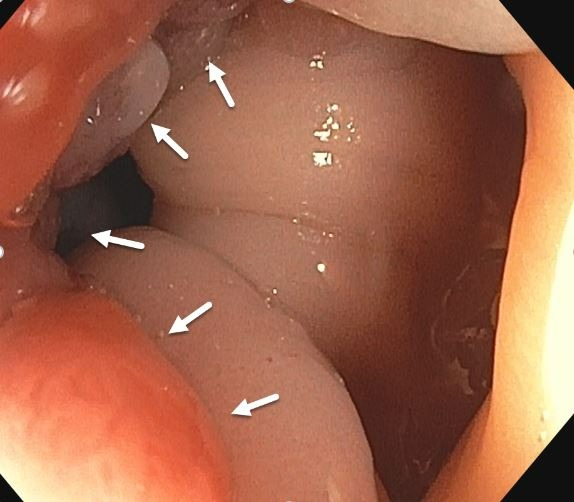Back
Poster Session D - Tuesday Morning
D0121 - Rectovaginal Endometriosis Mimicking Irritable Bowel Syndrome
Tuesday, October 25, 2022
10:00 AM – 12:00 PM ET
Location: Crown Ballroom

Huai-En R. Chang, MD, MPH, MBA
Kaiser Permanente Mid-Atlantic States Internal Medicine Residency Program
Gaithersburg, MD
Presenting Author(s)
Huai-En R. Chang, MD, MPH, MBA1, Amitosh K. Singh, MD1, Katrina Hsieh, DO1, Ling Yan, MD, PhD2, Alexis G. McCary, MD, PhD3
1Kaiser Permanente Mid-Atlantic States Internal Medicine Residency Program, Gaithersburg, MD; 2Kaiser Permanente Mid-Atlantic States, Rockville, MD; 3Kaiser Permanente Mid-Atlantic States, Largo, MD
Introduction: Rectovaginal endometriosis is the deposition of uterine tissue in the pelvis between the rectum and vagina. Identifying rectovaginal endometriosis is challenging because, though typically asymptomatic, rectovaginal endometriosis can present with symptoms that mimic irritable bowel syndrome (IBS) or colorectal cancer. Furthermore, there is no established disease-specific endoscopic and radiological diagnostic criteria. As the role of endoscopy in the assessment of bowel involvement is controversial, we present a case of rectovaginal endometriosis diagnosed on colonoscopy.
Case Description/Methods: A 35-year-old female with chronic abdominal pain, associated with alternating constipation and diarrhea, presented with new onset abdominal bloating and abdominal pain with defecation. She complained of increased symptom severity during her menstrual period and reported significant weight loss. There was no tenderness in the lower abdomen, rebound or guarding on examination. Routine lab results were only remarkable for mild anemia. A colonoscopy was performed, which revealed a 75% circumferential mass in the rectum at 20 cm [Figure 1]. Biopsies of the mass revealed colonic mucosal epithelium with pseudostratified glands lacking goblet cells in the lamina propria with granulation tissue-like stroma. Immunohistochemical analysis was positive for paired box gene 8 (PAX8), estrogen receptor (ER), and CD10, indicating the presence of endometrial tissue. Subsequent CT and MRI scans revealed invasive endometriosis involving the anterior wall of the rectum. The patient was scheduled for Gynecology consultation.
Discussion: Rectovaginal endometriosis is uncommon, affecting between 3.8% and 37% of all patients with endometriosis. Though it is rarer than ovarian or peritoneal endometriosis, when symptomatic, rectovaginal endometriosis is the most severe and painful variant of extragenital endometriosis. Most cases affecting the colon present in superficial layers, while deeply infiltrative disease (lesions that exceed 5 mm in depth) involving the muscularis mucosae occurring 95.1% of cases reported in a study. However, the incidence of colonoscopic findings of intestinal endometriosis in deep pelvic endometriosis is quite low (4%).

Disclosures:
Huai-En R. Chang, MD, MPH, MBA1, Amitosh K. Singh, MD1, Katrina Hsieh, DO1, Ling Yan, MD, PhD2, Alexis G. McCary, MD, PhD3. D0121 - Rectovaginal Endometriosis Mimicking Irritable Bowel Syndrome, ACG 2022 Annual Scientific Meeting Abstracts. Charlotte, NC: American College of Gastroenterology.
1Kaiser Permanente Mid-Atlantic States Internal Medicine Residency Program, Gaithersburg, MD; 2Kaiser Permanente Mid-Atlantic States, Rockville, MD; 3Kaiser Permanente Mid-Atlantic States, Largo, MD
Introduction: Rectovaginal endometriosis is the deposition of uterine tissue in the pelvis between the rectum and vagina. Identifying rectovaginal endometriosis is challenging because, though typically asymptomatic, rectovaginal endometriosis can present with symptoms that mimic irritable bowel syndrome (IBS) or colorectal cancer. Furthermore, there is no established disease-specific endoscopic and radiological diagnostic criteria. As the role of endoscopy in the assessment of bowel involvement is controversial, we present a case of rectovaginal endometriosis diagnosed on colonoscopy.
Case Description/Methods: A 35-year-old female with chronic abdominal pain, associated with alternating constipation and diarrhea, presented with new onset abdominal bloating and abdominal pain with defecation. She complained of increased symptom severity during her menstrual period and reported significant weight loss. There was no tenderness in the lower abdomen, rebound or guarding on examination. Routine lab results were only remarkable for mild anemia. A colonoscopy was performed, which revealed a 75% circumferential mass in the rectum at 20 cm [Figure 1]. Biopsies of the mass revealed colonic mucosal epithelium with pseudostratified glands lacking goblet cells in the lamina propria with granulation tissue-like stroma. Immunohistochemical analysis was positive for paired box gene 8 (PAX8), estrogen receptor (ER), and CD10, indicating the presence of endometrial tissue. Subsequent CT and MRI scans revealed invasive endometriosis involving the anterior wall of the rectum. The patient was scheduled for Gynecology consultation.
Discussion: Rectovaginal endometriosis is uncommon, affecting between 3.8% and 37% of all patients with endometriosis. Though it is rarer than ovarian or peritoneal endometriosis, when symptomatic, rectovaginal endometriosis is the most severe and painful variant of extragenital endometriosis. Most cases affecting the colon present in superficial layers, while deeply infiltrative disease (lesions that exceed 5 mm in depth) involving the muscularis mucosae occurring 95.1% of cases reported in a study. However, the incidence of colonoscopic findings of intestinal endometriosis in deep pelvic endometriosis is quite low (4%).

Figure: Rectovaginal endometriosis presenting as a 75% circumferential mass in the rectum at 20 cm
Disclosures:
Huai-En Chang indicated no relevant financial relationships.
Amitosh Singh indicated no relevant financial relationships.
Katrina Hsieh indicated no relevant financial relationships.
Ling Yan indicated no relevant financial relationships.
Alexis McCary indicated no relevant financial relationships.
Huai-En R. Chang, MD, MPH, MBA1, Amitosh K. Singh, MD1, Katrina Hsieh, DO1, Ling Yan, MD, PhD2, Alexis G. McCary, MD, PhD3. D0121 - Rectovaginal Endometriosis Mimicking Irritable Bowel Syndrome, ACG 2022 Annual Scientific Meeting Abstracts. Charlotte, NC: American College of Gastroenterology.
